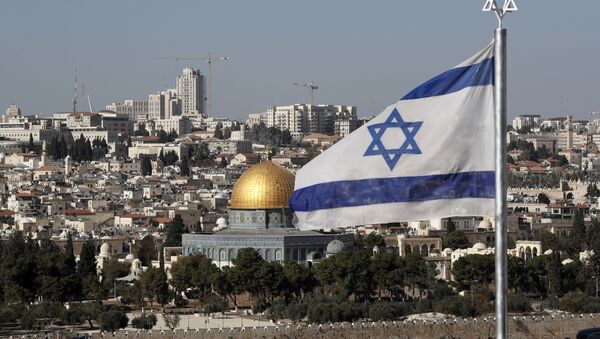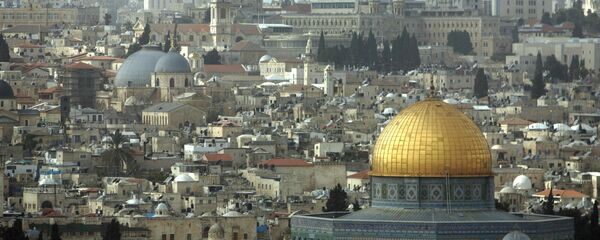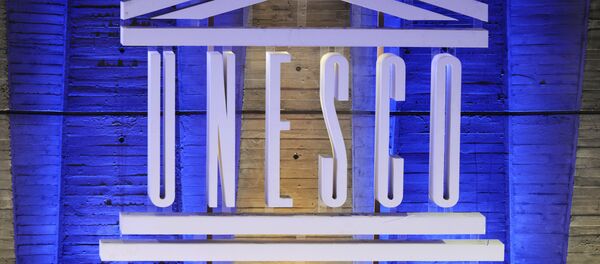JERUSALEM (Sputnik), Svetlana Alexandrova – US President Donald Trump has no plans to participate in the opening ceremony for the new embassy in Jerusalem, scheduled for May 14, but he may visit Israel in the summer, Israeli Minister for Jerusalem Affairs Zeev Elkin told Sputnik in an interview, without providing any information on a date or agenda for the possible visit.
"The US president is not planning to visit the opening ceremony. He visited Israel a year ago. It is not ruled out that Trump may come [to Israel] this summer, but he has no plans to attend this ceremony. With regard to the [possible visit in] summer, I will not provide further details right now," Elkin said.
Elkin went on to say that the US Embassy intends to organize a symbolic opening ceremony on May 14, which will be attended by high-profile US officials.
"A big event is being planned, with the United States represented at a serious [high] level. According to my information, the US Treasury Secretary will come to Israel, so will [senior] presidential adviser Kushner. Naturally, Israeli officials will also take part in the ceremony. For us, it is a very big event."
Speaking about security concerns in connection to the embassy's removal, Elkin said the US embassy will unlikely need additional protection and will keep the same level of security as was maintained in Tel Aviv.
At the same time, Elkin said that Israeli security forces believe that Hamas may use the US embassy move as an excuse to create chaos and launch attacks against Israel.
"It is planning to break the border between the Gaza Strip and Israel in a staged protest, but in fact, this will be clearly an attempt to attack Israel in order to create major unrest, which would lead to casualties among the Palestinian population and attract the attention of the world community," Elkin said.
Elkin said that Israel was expecting some unrest in both the Judea and Samaria to be initiated by the Palestinian autonomy, adding that the country had a lot of experience in dealing with such situations and the Israeli security forces were preparing for that.
In December, US President Donald Trump announced his decision to recognize Jerusalem as Israel's capital and instructed the US State Department to launch the process of moving the US embassy from Tel Aviv, to Jerusalem.
Withdrawal From UNESCO Will Not Affect Israel Financially
Israel's withdrawal from UNESCO will not affect the country’s activities aimed at preserving World Heritage Sites on its territory, since each country is financially responsible for maintaining its own sites, Zeev Elkin said, stressing that UNESCO had barely given financial support for preservation efforts in the past.
"Israel’s decision [to withdraw from UNESCO] doesn’t bother me. We’ve been taking care of the UNESCO Heritage Sites and will continue doing so … We received almost nothing from UNESCO, so we will not be affected financially," Elkin said.
The minister also stated that ever since Palestine became a UNESCO member in 2011, the organization was used to making political decisions, including those that did not correspond to the historical truth.
"For example, the decision that the Temple Mount in Jerusalem and the city center itself is only a Muslim place of worship and has nothing to do with Jewish history. Such decisions, overlooking the millenniums of Jewish history in Jerusalem, are absurd and unacceptable for an organization whose mission is to develop and protect heritage sites and defend the historical truth. We do not want to participate in this kind of farce," Elkin added.
In December 2017, Israel announced its decision to withdraw from the UNESCO after the United States said it would do the same several months prior. Israel had been reprimanding the organization in recent years over UNESCO's criticism of Israel's occupation of East Jerusalem and granting full membership to Palestine in 2011.
READ MORE: US Withdrawal From UNESCO Continues 'Disgraceful Behavior' Toward World Body
The Israeli government refuses to recognize Palestine as an independent political and diplomatic entity, and continues to build settlements in the occupied areas, despite objections from the United Nations.




